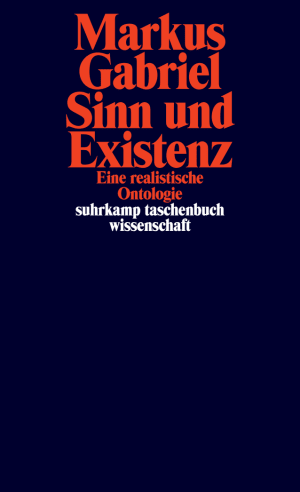Fictions
English world rights (Polity), Spain & Mexico (Materia Oscura), Argentina (Universidad Nacional de General San Martín), France (Vrin), Korea (The Open Books), Turkey (Ketebe)
At its centre lies the ability of...
At its centre lies the ability of humans to form a self-concept, which is fundamentally socially reproduced without being socially constructed. Fictions – paradigmatic dramatis personae of our aesthetic imagination such as Anna Karenina, Macbeth, Mephistopheles or Jed Martin, the protagonist of Michel Houellebecq’s The Map and the Territory – are effective processes of selfrepresentation of man’s intellectual way of life. To acknowledge this, the anthropological place of imagination at the centre must be given its due. That way, Gabriel’s New Realism overcomes the erroneous antinomy of illusion and reality in order to recalibrate our endangered sense of what is real.
»Philosopher Markus Gabriel takes an in-depth approach to target to zeitgeist.« Uwe Justus Wenzel, Frankfurter Allgemeine Zeitung
»There is a lot Markus Gabriel has to tell us ...« Burkhard Müller, Süddeutsche Zeitung
»With Fictions, Markus Gabriel has accomplished a dense and richly intertwined work that is thoroughly recommendable as an antidote to the academic fashions of naturalism and constructivism.« Thomas Palzer, Deutschlandfunk
»The way Gabriel faces terminological confusion and vagueness is impressive. There is something both light and unequivocal about it when he – often in a few pages – critically incorporates theories such as Habermas' The Structural Transformation of the Public Sphere in order to reframe it with a view to the digitalised public sphere.« Gert Scobel, Philosophie Magazin
»This author, who has only just turned 40, is the philosopher of the present.« Westdeutsche Allgemeine Zeitung
»With his epistemology [Markus Gabriel has] his finger on the pulse of the time and shows that philosophy can be highly relevant outside ivory tower of academia as well.« Claas Christophersen, NDR
»Philosopher Markus Gabriel takes an in-depth approach to target to zeitgeist.« Uwe Justus Wenzel, Frankfurter Allgemeine Zeitung
»There is a lot Markus Gabriel has to tell us ...« Burkhard Müller, Süddeutsche Zeitung
»With Fictions, Markus Gabriel has accomplished a dense and richly intertwined work that is thoroughly recommendable as an antidote to the academic fashions of naturalism and constructivism.« Thomas Palzer,...
DISCOVER
Just published: Suhrkamp Authors Around the World – February 2024, issue 2
We are delighted to present to you our latest arrivals!DISCOVER
Just published: Suhrkamp Authors Around the World – February 2024, issue 2
We are delighted to present to you our latest arrivals!Persons
Markus Gabriel
Markus Gabriel, born in 1980, is professor of Philosophy at the University of Bonn, where, together with Michael Forster, he directs the International Center for Philosophy.
Markus Gabriel, born in 1980, is professor of Philosophy at the University of Bonn, where, together with Michael Forster, he directs the...
OTHER PUBLICATIONS

Mind and Existence
Since Kant and Frege, contemporary ontology has assumed that there is no (common) property to existence. In this way the old question as to the meaning of being had been reformulated in a...
Spanish world rights (Herder), Chinese simplex rights (Chongqing Publishing House), Japan (Horinouchi Shuppan)

Scepticism and Idealism in Antiquity
By now it is considered a fact that modern epistemology discovered the problem of solipsism, whereas classical philosophy, being based on a »healthy« realism, is assumed to never have doubted the existence of a non-mental environment. This assumption is wrong, as Markus Gabriel proves in this groundbreaking study.
His hypothesis is that classical scepticism...
